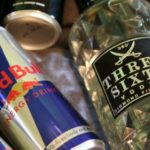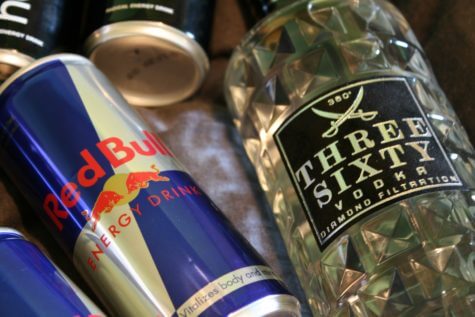PARIS, France — Substituting a Red Bull for cranberry juice in a common vodka with cranberry order at the bar may provide an extra buzz of energy, but a new study finds that just telling a drinker that the energy drink was added to the cocktail will increase their sense of risk-taking and drunkenness — even when Red Bull wasn’t actually in their beverage.
Researchers from the Paris-based INSEAD Sorbonne University Behavior lab discovered that even participants who were purposefully misled into believing their drink contained Red Bull still said they were feeling less inhibition and increased their intentions to approach and “chat up” women.
The study involving 154 young men separately labeled three cocktails, “Vodka & Red Bull, Fruit Juice Cocktail and Vodka Cocktail” for the participants. And despite the fact the three drinks all contained the exact same ingredients, the sheer belief that the young men were drinking an energy drink combination boosted several self-reported effects of intoxication. Those under the impression they were downing the vodka with Red Bull “were more likely to believe themselves quite drunk and uninhibited.”
“Beliefs that people have about a product can be just as important as the ingredients of the product itself,” says Pierre Chandon, a professor of marketing and co-author and director of the INSEAD Sorbonne Behavioral Lab in a press release. “Regulations and codes of conduct should consider the psychological–and not just physiological–effects of products.”

More than half of the young male participants (51 percent) reported an increase in intoxication when they believed the energy drink was an ingredient. In addition to confidence in approaching women, the young men were recorded taking more risks in a gambling activity. These effects were increased by participants who said they have a strong belief that mixing energy drinks with alcohol boosts the effects of drinking.
A recent study from the University of Victoria found that mixing alcohol and energy drinks increases imbibers risk of injury. Those authors concluded that “The stimulant effects of caffeine mask the result that most people get when they drink” and thus those individuals stayed out longer and drank more and more.
However, the authors of this study found that participants who consumed the faux “Red Bull and vodka” drink were more likely to wait longer before getting behind the wheel of a vehicle. The delay in getting behind the wheel increased by 14 minutes due to the participants’ misguided perception they were at a heightened level of drunkenness versus a fruit juice vodka drink.
“Red Bull has long used the slogan ‘Red Bull gives you wings,’ but our study shows that this type of advertising can make people think it has intoxicating qualities when it doesn’t,” says lead author Yann Cornil, Assistant Professor of the Sauder School of Business, at the University of British Columbia. “Essentially, when alcohol is mixed with an energy drink and people are aware of it, they feel like they’re more intoxicated simply because the marketing says they should feel that way.”
The study is the first showing a causal effect that mixing liquor and energy drinks based purely on perception affected real behaviors driven by the commonly held belief that Red Bull, Monster and other energy drinks boost the effects of alcohol. The authors note that people’s preconceived notions of a product can outweigh the reality. They also caution that policymakers and consumer protection agencies should reevaluate the ways in which energy drinks are labeled in stores and advertised as a whole.
“Given the psychological effects of energy-drink marketing, energy drink marketers should be banned from touting the disinhibiting effects of their ingredients,” adds Cornil.
“The silver lining was that emphasizing the energy drink in the cocktail made the participants less likely to drive,” says study co-author Aradhna Krishna, the Dwight F. Benton Professor of Marketing at the University of Michigan’s Ross School of Business “It seems that drunk-driving education is working enough to make people think hard about driving when they are feeling drunk.”
The study findings entitled, “Does Red Bull Give Wings to Vodka? Placebo Effects of Marketing Labels on Perceived Intoxication and Risky Attitudes and Behaviors” will be published forthcoming Journal of Consumer Psychology.
